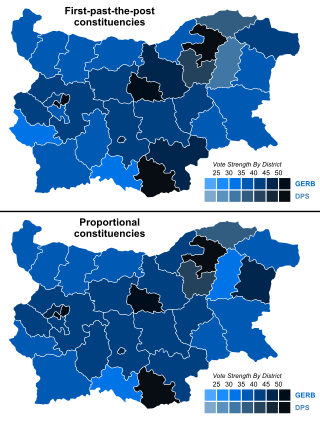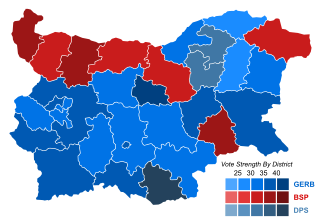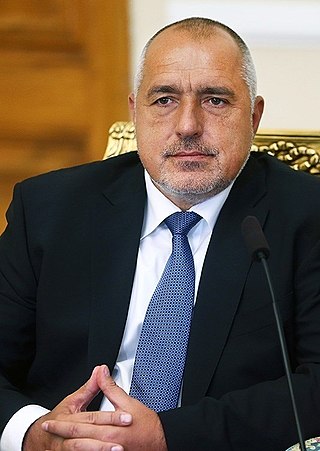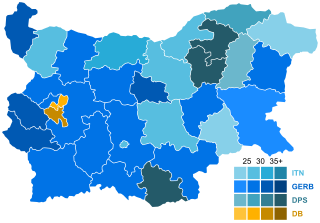
The politics of Bulgaria take place in a framework of a parliamentary representative democratic republic, whereby the prime minister is the head of government, and of a multi-party system. Executive power is exercised by the government. Legislative power is vested in both the government and the National Assembly. The Judiciary is independent of the executive and the legislature.
The electoral threshold, or election threshold, is the minimum share of the primary vote that a candidate or political party requires to achieve before they become entitled to representation or additional seats in a legislature. This limit can operate in various ways, e.g. in party-list proportional representation systems where an electoral threshold requires that a party must receive a specified minimum percentage of votes, either nationally or in a particular electoral district, to obtain seats in the legislature. In Single transferable voting the election threshold is called the quota and not only the first choice but also the next-indicated choices are used to determine whether or not a party passes the electoral threshold. In MMP systems the election threshold determines which parties are eligible for the top-up seats.

The National Movement for Stability and Progress is a liberal, populist political party in Bulgaria. It was known as the National Movement Simeon II until 3 June 2007.
The United Democratic Forces were a center-right electoral alliance in Bulgaria, led by the Union of Democratic Forces.

The Movement for Rights and Freedoms is a centrist political party in Bulgaria with a support base among ethnic minority communities.

The Union of Democratic Forces is a political party in Bulgaria, founded in 1989 as a union of several political organizations in opposition to the communist government. The Union was transformed into a single unified party with the same name. The SDS is a member of the European People's Party (EPP). In the 1990s the party had the largest membership in the country, with one million members, but has since splintered into a number of small parties totaling no more than 40,000 members. The SDS proper had 12,000 members in 2016.

The Communist Party of Bulgaria is a communist party in Bulgaria, currently led by Aleksandar Paunov.

The Political Movement "Social Democrats" is a social-democratic political party in Bulgaria. It was previously part of the Coalition for Bulgaria, an alliance led by the Bulgarian Socialist Party. In the 2001 elections the coalition won 17.1% of the popular vote and 48 out of 240 seats. At the legislative elections on 25 June 2005, the Coalition won 34.2% of the popular vote and 82 out of 240 seats. The party joined the electoral coalition We Continue the Change to compete in the November 2021 Bulgarian election.
The Agrarian Union "Aleksandar Stamboliyski", is a agrarian political party in Bulgaria.

Parliamentary elections were held in Bulgaria on 25 June 2005, for the 240 members of the National Assembly. According to exit polls, the Socialists had a lead with around 31%, but without a majority, necessitating the creation of a coalition. The National Movement for Simeon II, in power before the election, was in second place, with around 21%. Following the election, Socialist Party leader Sergei Stanishev became Prime Minister.

GERB, is a conservative, populist political party which was the ruling party of Bulgaria between 2009 and 2021.

Martin Dimitrov is a Bulgarian politician and former Member of the European Parliament. He was the leader of the Union of Democratic Forces (UDF) from 2008 to 2012.

Parliamentary elections were held in Bulgaria on 5 July 2009. With 40% of the vote, the decisive winner of the elections was the established in 2006 personalistic party of Boyko Borisov, GERB. The Socialist Party, in power before the election, was in second place, with around 18%. Оnce-ruling National Movement Simeon II did not cross the 4% threshold and won no seats. The turnout was 60.6%, one of the lowest ever. Following the election, GERB leader Boyko Borisov became Prime Minister. Just like all the previous parliamentary elections since the fall of communism, the government was not re-elected.
The Blue Coalition was a centre-right electoral alliance in Bulgaria, whose members were the Union of Democratic Forces (SDS), Democrats for a Strong Bulgaria (DSB) and three smaller parties. The members of the European Parliament elected on the coalition's list sat with the group of the European People's Party.

The Bulgarian Social Democratic Party is a social democratic political party in Bulgaria.

Parliamentary elections were held in Bulgaria on 5 October 2014 to elect the 43rd National Assembly. GERB remained the largest party, winning 84 of the 240 seats with around a third of the vote. A total of eight parties won seats, the first time since the beginning of democratic elections in 1990 that more than seven parties entered parliament. Boyko Borisov then became prime minister as head of a coalition with the Reformist Bloc and with outside support from the Patriotic Front and the Alternative for Bulgarian Revival.

Parliamentary elections were held in Bulgaria on 26 March 2017. They had originally been scheduled for 2018 at the end of the four-year term of the National Assembly. However, following the resignation of Prime Minister Boyko Borisov and the failure of Bulgarian parties to form a government, early elections were called. Borisov resigned following the defeat of Tsetska Tsacheva, the candidate of his GERB party, in the November 2016 presidential elections. The official election campaign began on 24 February.

The ninety-third Cabinet of Bulgaria took office on May 4, 2017. It was a coalition government that was chaired by Boyko Borisov. The government was formed after the Borisov's party, GERB, won the 2017 parliamentary election. However, GERB won only 95 out of 240 seats in the National Assembly and therefore needed to form a coalition in order to govern.

Parliamentary elections were held in Bulgaria on 4 April 2021 at the end of the term of National Assembly members elected in 2017. Parties in the governing coalition led by Boyko Borisov lost seats and no party leader was able to form a coalition government within the time limit. This triggered the July 2021 Bulgarian parliamentary election.

Snap parliamentary elections were held in Bulgaria on 11 July 2021 after no party was able or willing to form a government following the April 2021 elections. The populist party There Is Such a People (ITN), led by musician and television host Slavi Trifonov, narrowly won the most seats over a coalition of the conservative GERB and Union of Democratic Forces parties. Four other parties won seats in the 240-member Parliament as well.















